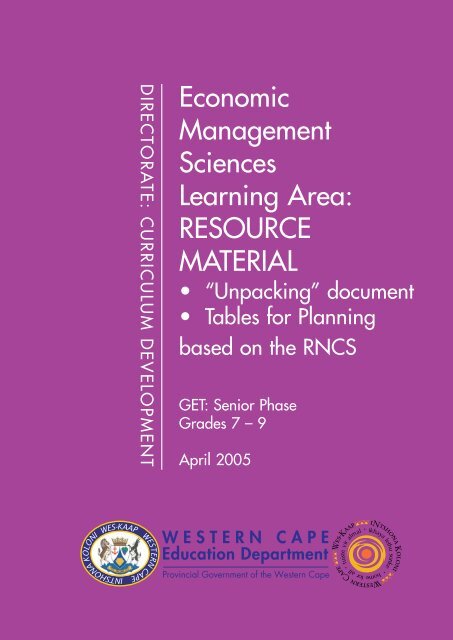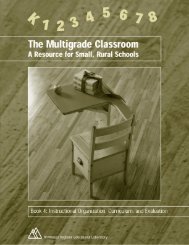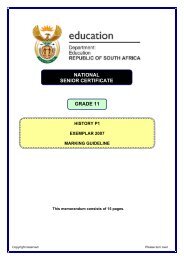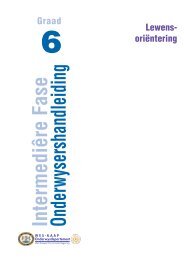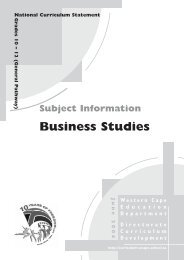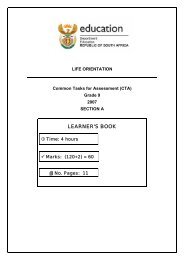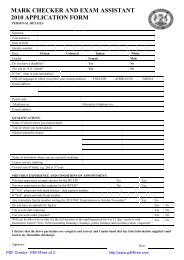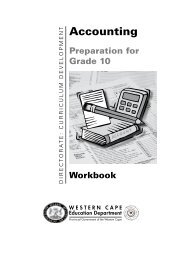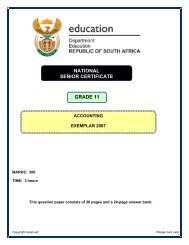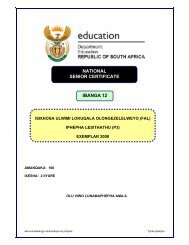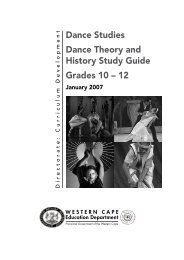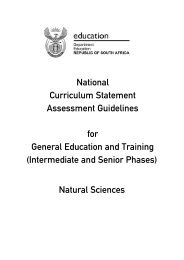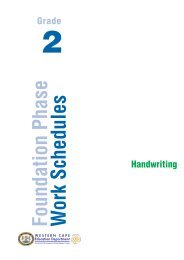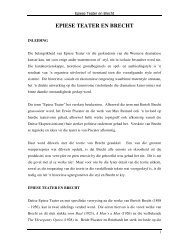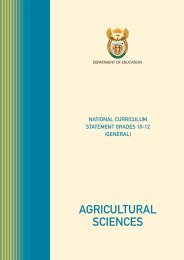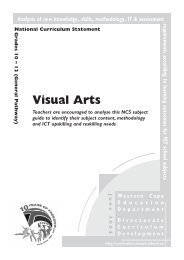Economic Management Sciences Learning Area - Curriculum ...
Economic Management Sciences Learning Area - Curriculum ...
Economic Management Sciences Learning Area - Curriculum ...
- No tags were found...
You also want an ePaper? Increase the reach of your titles
YUMPU automatically turns print PDFs into web optimized ePapers that Google loves.
DIRECTORATE: CURRICULUM DEVELOPMENT<br />
<strong>Economic</strong><br />
<strong>Management</strong><br />
<strong>Sciences</strong><br />
<strong>Learning</strong> <strong>Area</strong>:<br />
RESOURCE<br />
MATERIAL<br />
• “Unpacking” document<br />
• Tables for Planning<br />
based on the RNCS<br />
GET: Senior Phase<br />
Grades 7 – 9<br />
April 2005
CONTENTS<br />
LEARNING AREA: ECONOMIC AND MANAGEMENT SCIENCES<br />
PART ONE<br />
Page<br />
1. Introduction 1<br />
2. History of <strong>Economic</strong> and <strong>Management</strong> <strong>Sciences</strong> in the Western Cape 1<br />
3. From <strong>Curriculum</strong> 2005 to the RNCS 1<br />
4. The Nature of the <strong>Learning</strong> <strong>Area</strong>: <strong>Economic</strong> and <strong>Management</strong> <strong>Sciences</strong> 1<br />
5. The Unique Features and Scope of the EMS <strong>Learning</strong> <strong>Area</strong> 3<br />
PART TWO<br />
6. The Focus of EMS in the General Education and Training (GET) Band 4<br />
7. The Focus of EMS in the Senior Phase 6<br />
8. Teaching and <strong>Learning</strong> Strategies 9<br />
9. Extensions to <strong>Learning</strong> 10<br />
10. Barriers to <strong>Learning</strong> 10<br />
11. Infusion of Language and Mathematics 11<br />
12. The Senior Phase Learner 11<br />
13. Assessment 12<br />
PART THREE<br />
14. Introduction: EMS prepares for <strong>Learning</strong> in Grade 10 13<br />
15. Tables for Planning in the GET Band: <strong>Economic</strong> and <strong>Management</strong> <strong>Sciences</strong> 13<br />
ANNEXURES<br />
A Zopp Methodology 21<br />
B Additional Resources 22
PART ONE<br />
ECONOMIC AND MANAGEMENT SCIENCES (EMS)<br />
1. INTRODUCTION<br />
The purpose of this resource booklet is to provide information on the essential<br />
features of the <strong>Economic</strong> and <strong>Management</strong> <strong>Sciences</strong> learning area and to provide<br />
guidelines that will enable Senior Phase Teachers to make the transition from C2005<br />
to the Revised National <strong>Curriculum</strong> Statement (RNCS) in <strong>Economic</strong> <strong>Management</strong><br />
<strong>Sciences</strong>.<br />
2. HISTORY OF ECONOMIC MANAGEMENT SCIENCES IN THE WESTERN CAPE<br />
There are two OBE models currently practised in the Senior Phase in the Western<br />
Cape, viz. C2005 and the WCED hybrid. The WCED hybrid model is currently used<br />
in the teaching of <strong>Economic</strong> and <strong>Management</strong> <strong>Sciences</strong> in the Senior Phase (SP).<br />
3. FROM CURRICULUM 2005 TO THE RNCS<br />
<strong>Curriculum</strong> 2005 was streamlined into the Revised National <strong>Curriculum</strong> Statement<br />
(RNCS). The design features of the RNCS in <strong>Economic</strong> and <strong>Management</strong> <strong>Sciences</strong><br />
are the following:<br />
C2005<br />
Critical Outcomes<br />
(COs)<br />
Developmental<br />
Outcomes (DOs)<br />
Specific Outcomes<br />
(SOs)<br />
Phase Organisers<br />
(POs)<br />
<strong>Learning</strong> Programme<br />
Organisers (LPOs)<br />
Assessment Criteria<br />
(AC)<br />
Performance Indicators<br />
(PIs)<br />
Range Statements<br />
(RSs)<br />
Across<br />
Phase<br />
RNCS<br />
FP IP SP<br />
7 Critical Outcomes 7 7 7<br />
5 Developmental Outcomes 5 5 5<br />
8 <strong>Learning</strong> Outcomes 2 4 4<br />
6<br />
Assessment Standards<br />
37 47 61<br />
Prescribed Core Content Yes Yes Yes<br />
ECONOMIC AND MANAGEMENT SCIENCES (EMS)<br />
SENIOR PHASE<br />
4. THE NATURE OF THE LEARNING AREA: ECONOMIC AND MANAGEMENT<br />
SCIENCES<br />
Rationale for including knowledge, skills and values related to the <strong>Economic</strong><br />
and <strong>Management</strong> <strong>Sciences</strong> into the GET curriculum<br />
<strong>Economic</strong> and <strong>Management</strong> <strong>Sciences</strong> 1
THE BIG PICTURE<br />
4.1 Unemployment<br />
It is a well-known reality in many of our lives that South Africa is plagued by crime.<br />
The main reason for this is almost certainly the high rate of unemployment in our<br />
country. The reasons for the high rate of unemployment in South Africa are the<br />
following:<br />
♦<br />
South Africa currently rates poorly in relation to other developing countries in<br />
the world regarding the productivity of its economically active workforce.<br />
On international markets, our prices therefore do not compare favourably with<br />
those of other countries in general, and South Africa’s businesses and<br />
government therefore find it difficult to compete with those of other countries.<br />
This mainly stems from the fact that our education system, up to this stage, has<br />
not prepared learners adequately for the world of work. According to a report,<br />
Global Entrepreneurship Monitor, “Local entrepreneurs are being hobbled by<br />
three things…” which include “an education system that does not encourage<br />
entrepreneurship nor give young people the skills to run a business.” (Sunday<br />
Times: Business Times, February 13, 2005)<br />
♦<br />
♦<br />
Since 1994, more than a million jobs have been rationalised. A large proportion<br />
of these jobs lost is due to the worldwide phenomenon of jobless growth.<br />
This means that whilst big businesses are growing, making more profits and<br />
expanding, this is happening without a corresponding increase in job creation.<br />
The reasons for this can be found mainly in<br />
- the automation of processes: production processes are becoming<br />
increasingly capital (“machine”) intensive as opposed to labour intensive,<br />
- downsizing and rationalisation (less people have to cope with more<br />
responsibilities), and<br />
- delivering by cutting out certain levels of management.<br />
People in SA have traditionally been educated to become job seekers and<br />
not job creators. As a result of less jobs being available to economically active<br />
persons in South Africa, especially school leavers, ordinary people are, more<br />
than ever, required to provide for their own economic survival.<br />
The phenomenon of more and more persons becoming involved in the informal<br />
sector (i.e. street markets, businesses operated from home, etc), is the result of<br />
the limited options for the unemployed. Often informal businesses develop into<br />
the SMME (Small, Medium and Micro-enterprises) sector, which has created<br />
more jobs in the recent past than those provided by big business.<br />
However, many prospective starters of informal and micro businesses are set up<br />
for failure, because of the lack of basic economic and financial literacy<br />
knowledge, skills and values, including especially entrepreneurial, managerial<br />
and related skills that are essential for the starting of a new business and for<br />
keeping it running profitably.<br />
Though Entrepreneurship in South Africa compares favourably with the rest of<br />
Africa in creating jobs and growth, South Africa is last on the list of developing<br />
countries, according to the International Growth Entrepreneurship Monitoring<br />
agency (GEM). The GEM claims that in the previous South African education<br />
system, the cultural and social norms were not conducive to the fostering of an<br />
<strong>Economic</strong> and <strong>Management</strong> <strong>Sciences</strong> 2
entrepreneurial mind frame. The key to solving this is to build<br />
entrepreneurial capacity at school level. Yet a changed mindset of the<br />
majority of South Africans may only happen over a much longer period of time.<br />
4.2 The rapid development of knowledge and technology in the commercial,<br />
economic and financial fields<br />
As a result of the rapid rate at which technology in the field of commerce and banking<br />
has developed, and keeps developing almost every day, economic, commercial<br />
and financial literacy has become utmost important.<br />
Also the way in which money is being handled in the business world, has made it<br />
essential for the individual to manage his/her finances meticulously. It has become<br />
possible to do payments by cheque, cash card, credit card, debit order, stop order,<br />
telephone or computer (e-transactions) from home without a person ever handling<br />
any hard cash. People should therefore be able to keep up with the technology in<br />
order to remain in charge of their finances.<br />
The <strong>Economic</strong> and <strong>Management</strong> <strong>Sciences</strong> learning area has been developed to<br />
address the acquisition of the knowledge, skills, values and attitudes required in<br />
order to survive in an extremely demanding economic world.<br />
5. THE UNIQUE FEATURES AND SCOPE OF THE EMS LEARNING AREA<br />
This learning area enables learners to participate meaningfully in the living, exciting<br />
world of economics and management, firstly at a personal level, but also at home,<br />
school and in the local community. This will contribute to the development of learners<br />
as persons with the necessary knowledge, skills and values to participate<br />
meaningfully as consumers, producers or managers at the different stages of their<br />
lives, whilst caring for others and the environment.<br />
The context of the EMS RNCS is closely related to that of the EMS C2005: The<br />
former eight specific outcomes have been integrated to form the four <strong>Learning</strong><br />
Outcomes of the RNCS.<br />
RNCS <strong>Learning</strong> Outcomes<br />
Some main aspects of C2005 Specific<br />
Outcomes used in formulating the<br />
RNCS EMS learning area<br />
1 The <strong>Economic</strong> Cycle / Circular flow SO2, SO3, SO5, SO 6<br />
2 Sustainable Growth and Development SO2, SO 7, SO 8<br />
3 Managerial, Consumer and Financial SO2, SO 4<br />
Knowledge and Skills<br />
4 Entrepreneurial Knowledge and Skills SO 1, SO2, SO 3<br />
The underlying critical and developmental outcomes are important to EMS.<br />
Identifying and solving problems and making decisions using critical and creative<br />
thinking, together with the development of entrepreneurial opportunities, are<br />
particular relevant to the economic field.<br />
<strong>Economic</strong> and <strong>Management</strong> <strong>Sciences</strong> 3
PART TWO<br />
6. THE FOCUS OF EMS IN THE GENERAL EDUCATION AND TRAINING (GET)<br />
BAND<br />
In the GET Band (Grade R – 9) learners will gain knowledge, skills, values and<br />
attitudes regarding the following broad aspects:<br />
<br />
The economic problem<br />
This feature deals with the problem of how individual persons, businesses and<br />
governments deal with the issue that the unlimited wants of a person or the<br />
people of the community, country etc. cannot be satisfied by the limited<br />
resources available.<br />
Limited<br />
Resources<br />
UNLIMITED WANTS<br />
<br />
The economic cycle (circular flow - this term is preferred to the term<br />
“economic cycle”) in the economy<br />
This is a model of how money, goods and services flow between households,<br />
business, government and the foreign sector. It also explores the roles and<br />
responsibilities of the different persons (role players) in these households,<br />
businesses and government in the economy.<br />
Level of complexity:<br />
Foundation phase: The focus is on households and business (at a very basic<br />
level) only.<br />
Intermediate Phase: The circular flow is expanded to include business and<br />
government as role-players in the economy.<br />
Senior phase: The circular flow is further extended to include the foreign<br />
sector.<br />
<strong>Economic</strong> and <strong>Management</strong> <strong>Sciences</strong> 4
MONEY<br />
GOODS & SERVICES<br />
CONSUMERS PRODUCERS<br />
Taxation<br />
Services<br />
GOVERNMENT<br />
Taxation<br />
Services<br />
(HOUSEHOLDS) LABOUR<br />
(BUSINESS SECTOR)<br />
SALARIES AND WAGES (MONEY)<br />
FOREIGN<br />
SECTOR<br />
<strong>Economic</strong> and <strong>Management</strong> <strong>Sciences</strong> 5
Reconstruction, sustainable growth and development<br />
This is contributes to the sustainable growth of the economy, reduce poverty<br />
and distribute wealth fairly, while still pursuing the principles of an open<br />
market and profitability. Respect for the environment, human rights and<br />
responsibilities are also promoted.<br />
The economic environment<br />
The economic environment is the environment in which goods and services<br />
are produced and consumed and where trade takes place. The EMS learning<br />
area engages learners in the physical, social, technological, political and legal<br />
environments, and also focuses on the world as a set of related and interdependant<br />
systems. For example, natural disasters such as the tsunami<br />
(Philippines/Somali) affect social lives of people / availability of products (and<br />
their prices) e.g. oil and gold price; oil polluted beaches affect sea-life and<br />
tourism; new technology affects social patterns, e.g. cell phones, TV; and air<br />
pollution affects health.<br />
Leadership and management<br />
This aspect explores the following:<br />
- basic aspects of leadership, such as planning and directing<br />
- negotiation, motivation, delegations and conflict management<br />
- basic aspects of management, such as planning, organising,<br />
guidance/monitoring and control<br />
- marketing, purchasing, public relations and human resource development<br />
- rights and responsibilities of management and workers<br />
Entrepreneurship<br />
This feature develops the knowledge, skills and attitudes related to taking<br />
initiative and calculating the risks in conceptualising, financing, starting and<br />
running a business. There is a special focus on responsible entrepreneurship<br />
within communities and environments.<br />
Financial and consumer knowledge and skills<br />
This feature introduces consumer knowledge and skills, personal finance and<br />
accounting knowledge and skills.<br />
7. THE FOCUS OF EMS IN THE SENIOR PHASE<br />
7.1 In the Senior Phase learners will engage with four <strong>Learning</strong> Outcomes. They are<br />
L0 1 The economic cycle / circular flow<br />
LO 2 Sustainable growth and development<br />
LO 3 Managerial, consumer and financial knowledge and skills<br />
LO 4 Entrepreneurial knowledge and skills<br />
NOTE: It should be noted that learners engage with all four learning outcomes<br />
through the Intermediate Phase (Grade 4 – 6) and into the Senior Phase (Grade 7 –<br />
9). The learning area is thus linked clearly with Grade 6. Looking beyond Grade 9,<br />
EMS prepares learners for the FET field of Business, Commerce, <strong>Management</strong> and<br />
<strong>Economic</strong> and <strong>Management</strong> <strong>Sciences</strong> 6
Service Studies. In particular, EMS prepares learners for the subjects, Accounting,<br />
Business Studies and <strong>Economic</strong>s in Grade 10. If the foundation of EMS is firm,<br />
learners will manage the transition to Grade 10 well. For example, Accounting<br />
concepts, source documents and subsidiary journals are introduced in Grade 9.<br />
The overall focus for the Senior Phase is set out below, followed by the<br />
specific focuses for Grades 7, 8 and 9.<br />
7.2 Overall Focus for the Senior Phase<br />
The Senior Phase will focus on the following:<br />
• The economy and its effect on the needs and wants of people<br />
• Role-players in the economy<br />
• Factors of production<br />
• Private, public and co-operative ownership<br />
• The policies and role of the state in promoting economic growth and<br />
development<br />
• Introduction to international economic arrangements, co-operation and<br />
globalisation<br />
• The need for skills and values relating to business, social and environmental<br />
issues<br />
• The importance of effective management in:<br />
• business and leadership,<br />
• human resources issues and productivity,<br />
• financial control, accounting and record keeping, and<br />
• public relations and marketing<br />
• The role of the entrepreneur<br />
• Market research and feasibility studies before starting a business<br />
• The role of small, medium and micro enterprises in economic growth<br />
7.3 Focus for Grade 7<br />
The focus for Grade 7 will be on the following:<br />
• The needs and wants of different communities in society<br />
• Free and economic goods, and the influence of demand and supply<br />
• Power relations, rights and responsibilities of the different participants in the<br />
economic cycle<br />
• Different business activities within the different sectors<br />
• Identification of steps for redress of socio-economic imbalances and poverty<br />
• Savings and investments<br />
• The role of general management in business<br />
<strong>Economic</strong> and <strong>Management</strong> <strong>Sciences</strong> 7
• Different approaches towards management and leadership<br />
• The availability of postal and telecommunication services, and their role in<br />
improving administration<br />
• Use of information technology in management and administration<br />
• Elementary statement of net worth<br />
• Processes of human resource management<br />
• The design of questionnaires in market research and advertising<br />
• The characteristics of entrepreneurship<br />
• The differences between entrepreneurship, ownership and management<br />
7.4 Focus for grade 8<br />
The focus for grade 8 will be on the following:<br />
• <strong>Economic</strong> systems, the economic cycle and the economic problem<br />
• The role, rights and responsibilities of trade unions<br />
• Inflation as an economic issue<br />
• The national budget and economic growth and development<br />
• RDP and economic growth and restructuring<br />
• The relationship between technology, productivity and economic growth<br />
• The role of banks as savings and investment institutions<br />
• Interest on investments<br />
• Sources of information on different levels and categories of job opportunities<br />
• Basic market research for an identified business opportunity<br />
• Financial concepts and financing of a business<br />
• Financial feasibility<br />
• Different forms of ownership<br />
7.5 Focus for grade 9<br />
The focus for grade 9 will be on the following:<br />
• The flow of money, the economic cycle and the foreign sector<br />
• Demand, supply and pricing<br />
• Trade unions and their influence on the economy<br />
• The impact of the national budget on the economy<br />
• Regional and international agreements, productivity, globalisation and<br />
economic growth<br />
• The role of savings and investments in economic growth and development<br />
• Successes and shortcomings of the RDP in redressing historical disadvantages<br />
• Accounting as a tool for management of a business<br />
<strong>Economic</strong> and <strong>Management</strong> <strong>Sciences</strong> 8
• The use of computer technology in improving accounting and record keeping<br />
• Improving the learner’s understanding of all aspects of management, to<br />
improve learner employability, especially of<br />
• administration,<br />
• finances and accounting,<br />
• record keeping,<br />
• human resources and conditions of employment,<br />
• technology, and<br />
• public relations and marketing<br />
• Feasibility studies, the business plan and SWOT analysis<br />
• The role of small, medium and micro enterprises<br />
8. TEACHING AND LEARNING STRATEGIES<br />
Effective teaching and learning of the EMS learning area will draw on a range of<br />
philosophies of education and approaches to teaching, learning and assessment.<br />
These include experiential learning, appropriate linking of theory and practice, and<br />
adoption of a process model. This is because learners need both a sound theoretical<br />
understanding of EMS, and — from as early an age as possible — a progressively<br />
effective ability to apply the knowledge, skills, attitudes and values associated with it<br />
in related useful activities. These in turn will reinforce theoretical learning of the<br />
desired qualities.<br />
Increasing involvement in activity applies especially to LOs 3 and 4, which deal with<br />
the development of managerial and entrepreneurial skills, respectively; and to a<br />
lesser extent to LOs 1 and 2, which deal with reconstruction and growth and with how<br />
the economic cycle addresses the economic problem.<br />
This broad learning process in EMS relates to the nature and processes of<br />
production and distribution, and to their business and production management, in the<br />
contexts of both South Africa’s economy and society and alternative socio-economic<br />
systems.<br />
EMS requires, moreover, that learners understand the need for the promotion of<br />
growth and job-creation and the reduction of poverty, while respecting the<br />
environment, human rights, social justice and inclusivity. The full scope of the<br />
learning area therefore demands of its learners a wide range of knowledge, skills,<br />
attitudes and values, in both theory and practice.<br />
EMS knowledge helps learners to become aware, active economic citizens, and<br />
gives special attention to helping them meet the challenges of development, growth<br />
and job creation. The process approach, in the context of experiential learning, sees<br />
the learners as active beings.<br />
They are entitled and encouraged to participate in the decision-making that affects<br />
them, and to consciously construct meaning from reality. In the process approach,<br />
<strong>Economic</strong> and <strong>Management</strong> <strong>Sciences</strong> 9
the development of the learner and how he or she attained the LOs is as important, if<br />
not sometimes more important, than the attainment of the LOs.<br />
EMS should be a practical, enjoyable, participatory learning experience for every<br />
learner. The <strong>Economic</strong> and <strong>Management</strong> <strong>Sciences</strong> learning area is ideally suited to<br />
be an enjoyable, practical learning area where learners can truly learn through play.<br />
The world of economics and business is alive, vibrant and conspicuous around all of<br />
us every day – this reality should be exploited fully through the curriculum. Children<br />
learn most things much easier by doing and experiencing – this is almost always<br />
achievable through the EMS learning area’s LOs.<br />
The ZOPP methodology is a modern, international teaching and learning strategy for<br />
learners at all levels (school and adult learning centres). It can be introduced to<br />
learners even from Grade 1 (read only), but especially with great effect once learners<br />
can write words and short phrases, which is the essence of the ZOPP methodology<br />
(Refer to Annexure 1). In fact this is a strategy that can be used for developing<br />
literacy (reading and writing) in the Foundation Phase and Intermediate Phase.<br />
9. EXTENSIONS TO LEARNING<br />
The EMS learning area allows for expanded opportunities for learners gifted in the<br />
various multiple intelligences through, for example, visits to businesses and financial<br />
institutions, or running their own businesses, as well as through research<br />
opportunities of current events and information portrayed in the media.<br />
Learners who require extension can be made aware of the World Tourism Day and<br />
Small Business Week annually. Projects/Assignments should ideally be developed<br />
around these events.<br />
10. BARRIERS TO LEARNING<br />
VISUAL IMPAIRMENT<br />
Ensure that flash cards, posters and OHP transparencies are in enlarged print or<br />
writing. Place learners in front of class.<br />
ATTENTION DISORDERS<br />
When planning learning experiences, ensure that the interests of the learners are<br />
accommodated, by including teaching and learning strategies that address the<br />
different multiple intelligences, where applicable.<br />
Teachers should give clear and concise instructions and limit distractions in the<br />
classroom.<br />
WEAK MOTOR SKILLS<br />
Teachers should allow more time for learners with fine motor skills deficiencies to<br />
complete tasks in Accounting.<br />
Teachers should allow more time for learners with gross motor skills deficiencies to<br />
complete activities such as the Market Day.<br />
<strong>Economic</strong> and <strong>Management</strong> <strong>Sciences</strong> 10
DYSLEXIA<br />
Teachers are to ensure that there are spelling programmes in place. Instead of<br />
writing, dyslexic learners may be allowed to name or describe content.<br />
MEDIUM OF INSTRUCTION (MOTHER TONGUE)<br />
Give special attention to the learners whose mother tongue is different to the medium<br />
of instruction.<br />
OVERCROWDED CLASSROOMS<br />
Where possible, EMS classes should make use of the school hall/ larger venues and<br />
the quad to facilitate group work and Market Days.<br />
HEARING IMPAIRED<br />
The teacher should place learners with hearing disabilities as close to the front as<br />
possible, within hearing range, and ensure that his/her mouth is always visible to the<br />
learner for lip-reading purposes.<br />
If the learner is restricted to hearing in one ear, the teacher should ensure that the<br />
hearing ear faces the sound.<br />
For further information regarding the overcoming of barriers to teaching, learning and<br />
assessment refer to the Teacher’s guide for the development of <strong>Learning</strong><br />
Programmes (EMS), paragraph 2.6, pp 30 to 32.<br />
11. INFUSION OF LANGUAGE AND MATHEMATICS<br />
The infusion of language and mathematics into the EMS learning area is essential<br />
and can easily be achieved. The cognitive verbs (see underlined words) used in the<br />
ASs suggest how it can be done, for example: describes, presents stories, shares<br />
reasons, expresses thoughts, (language) and calculates change, identifies prices<br />
clearly, etc. (mathematics).<br />
12. THE SENIOR PHASE LEARNER<br />
In this phase learners should be provided with opportunities to acquire, develop and<br />
apply a range of more advanced knowledge, understanding and skills. Breadth,<br />
depth, access and entitlement are particularly important to ensure that learners are<br />
given a sound basis from which to take advantage of choices at the FET phase.<br />
Learners should know enough about the nature of the options to ensure their<br />
decisions about future choices are informed ones.<br />
The phase suggests that the essence of the curriculum at the Senior Phase is<br />
transitional, to inform choice and to enable independence on the part of the learner.<br />
The Senior Phase EMS consolidates the features of the EMS experience from the<br />
Foundation and Intermediate Phases.<br />
Furthermore, the Senior Phase prepares the learners to focus on critical and creative<br />
thinking skills, attitude development and the understanding of their role in society,<br />
which facilitate the choices they have to make for the Further Education and Training<br />
(FET) Band.<br />
<strong>Economic</strong> and <strong>Management</strong> <strong>Sciences</strong> 11
13. ASSESSMENT<br />
The assessment practices that are encouraged through the RNCS for Grades R - 9<br />
(Schools) are continuous, planned and integrated processes of gathering information<br />
about the performance of learners measured against the LOs. The levels at which the<br />
learner is to be assessed are provided by the ASs, which are progressively more<br />
complex from grade to grade.<br />
A <strong>Learning</strong> Programme, Work Schedule and Lesson Plan design should ensure that<br />
assessment is an integral part of teaching, learning and assessment.<br />
The purpose of assessment is twofold: On the one hand, it is used to monitor and<br />
support the process of learning and teaching towards improvement (Assessment for<br />
learning); and on the other, it is used to give an overall picture of learner’s progress<br />
at a given time, for example, at end of term or year, or transfer to another school<br />
(Assessment of learning).<br />
Forms of assessment:<br />
• Test<br />
• Performance-based assessment<br />
• Interviews<br />
• Questionnaires<br />
• Structured questions<br />
• Assignments<br />
• Case studies<br />
• Practical exercises/demonstrations<br />
• Project<br />
• Role-plays<br />
• Simulations<br />
• Aural/Oral questions<br />
• Observations<br />
• Self-report assessment<br />
<strong>Economic</strong> and <strong>Management</strong> <strong>Sciences</strong> 12
PART THREE<br />
14. INTRODUCTION: EMS PREPARES FOR LEARNING IN GRADE 10<br />
Teachers who are developing <strong>Learning</strong> Programmes, Work Schedules and Lesson<br />
Plans should note that certain of the LOs and ASs link conceptually with subjects in<br />
the FET band. Take the subject Accounting for example. It is essential to give<br />
adequate attention to EMS LO 3 and those ASs that focus on Accounting (namely Gr<br />
7: 7.3.5; Gr 8: 8.3.1, 8.3.3 and 8.3.5; and Gr 9: 9.3.1, 9.3.3 and 9.3.5). This should<br />
lay a sound foundation for managing the LOs for Accounting in Gr 10. Another<br />
example is the requirement in Grades 8 and 9 to introduce keyboard skills (AS 8.3.4<br />
and 9.3.4). Clear links can also be noted with Business Studies and <strong>Economic</strong>s in<br />
Grade 10, for example LOs 1 and 2 and those ASs.<br />
15. TABLES FOR PLANNING IN THE GET BAND: ECONOMIC AND MANAGEMENT<br />
SCIENCES<br />
The following tables can be found on the Internet at<br />
http://curriculum.wcape.school.za/ncs/index<br />
They are also available on CD from Edumedia: Tel: (021) 689 9536, Fax: (021) 685<br />
7421, e-mail: edumedia@pgwc.gov.za<br />
These tables use the exact wording of the ASs, making them extremely useful for<br />
planning. For each LO, the ASs, which are shown horizontally across the tables,<br />
reflect progression across the phase. For example:<br />
Grade 7 LO 3 AS 7.3.1 Explains the role of planning, organising, leading and<br />
controlling (e.g. financial and procedural controls) in a business<br />
Grade 7 LO 3 AS 7.3.2 Discusses different approaches to leadership and<br />
management<br />
Grade 8 LO 3 AS 8.3.2 Develops leadership and management strategies that will<br />
ensure a return on investments<br />
Grade 9 LO 3 AS 9.3.2 Investigates the public relations, social responsibility<br />
strategies and environmental responsibility strategies and actions of different<br />
businesses and organisations<br />
Thus, the progression in the above-mentioned ASs, horizontally across the tables<br />
(Grades), is as follows:<br />
<br />
<br />
The conceptual progression is clearly illustrated with the expansion of<br />
management functions, from basic management functions in Grade 7, to<br />
leadership and management strategies in Grade 8, and to public relations, social<br />
responsibility and environmental responsibilities in Grade 9.<br />
Progression is also achieved through the level of complexity of the response<br />
required from the learner by the AS, as indicated by the cognitive verbs, e.g.<br />
Explains (Grade 7), Develops (Grade 8) to Investigates (Grade 9).<br />
<strong>Economic</strong> and <strong>Management</strong> <strong>Sciences</strong> 13
Progression within a particular LO and within a particular grade, looking vertically<br />
from the top down, can also be observed, although this trend cannot be noticed for all<br />
the grades/Los, e.g. Grade 7 <strong>Learning</strong> Outcome 4:<br />
AS 7.4.1<br />
AS 7.4.3<br />
AS 7.4.5<br />
AS 7.4.6<br />
AS 7.4.9<br />
Compares essential characteristics and skills needed to be<br />
entrepreneurial from two different simple case studies of practising<br />
entrepreneurs in own community<br />
Uses idea generation techniques to make recommendations on using<br />
community resources to generate income in a responsible way<br />
Participates in a joint venture between the school and the<br />
community/parents by taking ownership of producing a product or service<br />
Runs a business event using one of two of the ideas or opportunities<br />
identified in a questionnaire that had been designed<br />
Designs posters or other materials to advertise own business venture<br />
Here progression within a particular grade is obtained: The level of<br />
complexity increases within the grade, as the cognitive verbs increasingly<br />
require a higher cognitive level, i.e. Compares, Make recommendations,<br />
Participates, Runs a business, Designs.<br />
<strong>Economic</strong> and <strong>Management</strong> <strong>Sciences</strong> 14
SENIOR PHASE ECONOMIC & MANAGEMENT SCIENCES<br />
LEARNING OUTCOMES & ASSESSMENT STANDARDS GRADES 7-9<br />
<strong>Learning</strong> Outcome 1: THE ECONOMIC CYCLE<br />
The learner will be able to demonstrate knowledge and understanding of the economic cycle within the context of ‘the economic problem’.<br />
Grade 6 Grade 7 Grade 8 Grade 9<br />
Assessment Standards<br />
Assessment Standards<br />
Assessment Standards<br />
Assessment Standards<br />
We know this when the learner: We know this when the learner: We know this when the learner: We know this when the learner:<br />
Describes the roles of households,<br />
businesses and government in the<br />
economic cycle.<br />
7.1.1<br />
Explains needs and wants and how the<br />
differences between them impact on<br />
communities and the environment.<br />
8.1.1<br />
Describes the historical development of<br />
money and its role in societies and their<br />
economies.<br />
9.1.1<br />
Explains the different flows of money,<br />
factors of production, goods and services<br />
in the economic cycle within the South<br />
African economy.<br />
Compares the rights and responsibilities<br />
of each of the participants in the<br />
production and consumption of resources<br />
and services.<br />
7.1.2<br />
Describes the different types of<br />
businesses and activities within the<br />
primary, secondary and tertiary sectors.<br />
8.1.2<br />
Discusses how trade (import and export)<br />
addresses the economic problem (choice<br />
and opportunity cost), and the role of<br />
banks in investing in the economy.<br />
9.1.2<br />
Discusses the role of the foreign sector in<br />
the economic cycle.<br />
Presents different flows of resources and<br />
services in the economic cycle (e.g. the<br />
flow of wages to households in exchange<br />
for labour; the flow of money to<br />
businesses in exchange for goods and<br />
services).<br />
7.1.3<br />
Explains the concepts ‘free’ and<br />
‘economic’ (scarce) goods, and the<br />
influence of demand and supply on<br />
market prices.<br />
8.1.3<br />
Explains how different economic systems<br />
address the economic problem (e.g.<br />
planned, market and mixed economies).<br />
9.1.3<br />
Illustrates by means of a graph and<br />
discusses how demand and supply<br />
influence prices.<br />
Explains different types of taxes and how<br />
they influence consumers and<br />
businesses.<br />
7.1.4<br />
Describes and debates the power<br />
relationships, economic rights and<br />
responsibilities between:<br />
8.1.4<br />
Discusses the role, rights and<br />
responsibilities of trade unions.<br />
9.1.4<br />
Critically assesses the influence and<br />
actions (strikes and stay aways) of trade<br />
unions in general and during the<br />
apartheid era on:<br />
• consumer and producer;<br />
• employer and employee;<br />
• the South African economy;<br />
<strong>Economic</strong> and <strong>Management</strong> <strong>Sciences</strong> 15
• government and business. • political, economic and social<br />
transformation;<br />
• labour issues.<br />
7.1.5 8.1.5<br />
Explains what inflation is and discusses<br />
reasons for changes in inflation rates.<br />
9.1.5<br />
Discusses the effect of the national<br />
budget on the economy (e.g. taxation<br />
and expenditure on education, social<br />
welfare, health and security).<br />
<strong>Learning</strong> Outcome 2: SUSTAINABLE GROWTH AND DEVELOPMENT<br />
The learner will be able to demonstrate an understanding of sustainable growth, reconstruction and development, and to reflect critically on its related processes.<br />
Grade 6 Grade 7 Grade 8 Grade 9<br />
Assessment Standards<br />
Assessment Standards<br />
Assessment Standards<br />
Assessment Standards<br />
We know this when the learner:<br />
We know this when the learner: We know this when the learner: We know this when the learner:<br />
Explains economic actions taken against<br />
the apartheid government to bring about<br />
change (e.g. sanctions, disinvestment),<br />
and how these impacted on change,<br />
growth and development.<br />
7.2.1<br />
Collects information on the influence of<br />
apartheid economic policies on<br />
ownership, poverty, wealth and quality.<br />
8.2.1<br />
Investigates and describes how the<br />
national budget is used to influence<br />
growth and redress economic<br />
inequalities.<br />
9.2.1<br />
Discusses how the national budget,<br />
regional and international agreements<br />
can be used to facilitate sustainable<br />
growth and development.<br />
Identifies steps that can be taken by the<br />
government to redress historic<br />
imbalances and poverty (e.g.<br />
redistribution of resources, gender equity,<br />
capacity building, restoring people’s<br />
dignity, creating opportunity and<br />
empowerment).<br />
7.2.2<br />
Identifies steps required to redress socioeconomic<br />
imbalances and poverty.<br />
8.2.2<br />
Investigates how the RDP could have<br />
been used to stimulate economic growth<br />
and restructuring (e.g. capacity building,<br />
jobs).<br />
9.2.2<br />
Investigates and debates the successes<br />
and shortcomings of the RDP.<br />
7.2.3<br />
8.2.3<br />
9.2.3<br />
Compares and discusses the difference<br />
between savings and investments.<br />
Discusses the importance of savings for<br />
investments.<br />
Explains the role of savings and<br />
investments in economic prosperity and<br />
growth.<br />
7.2.4<br />
Discusses the meaning of productivity.<br />
8.2.4<br />
Investigates and reports on how<br />
9.2.4<br />
Discusses productivity and its effects on<br />
<strong>Economic</strong> and <strong>Management</strong> <strong>Sciences</strong> 16
technology can improve productivity,<br />
economic growth, living standards, etc.<br />
economic prosperity, growth and global<br />
competition.<br />
Researches and analyses standards of<br />
living and patterns of consumption in<br />
modern societies where people<br />
specialise and trade to satisfy needs and<br />
wants.<br />
<strong>Learning</strong> Outcome 3: MANAGERIAL, CONSUMER AND FINANCIAL KNOWLEDGE AND SKILLS<br />
The learner will be able to demonstrate knowledge and the ability to apply responsibly a range of managerial, consumer and financial skills.<br />
Grade 6 Grade 7 Grade 8 Grade 9<br />
Assessment Standards<br />
Assessment Standards<br />
Assessment Standards<br />
Assessment Standards<br />
We know this when the learner:<br />
We know this when the learner: We know this when the learner: We know this when the learner:<br />
7.3.1<br />
Explains the role of planning, organising,<br />
leading and controlling (e.g. financial and<br />
procedural controls) in a business.<br />
8.3.1<br />
Differentiates between financial concepts<br />
used in business (e.g. fixed assets,<br />
current assets, liabilities, owner’s equity).<br />
9.3.1<br />
Completes a basic income statement and<br />
balance sheet for a service and retail<br />
business.<br />
Explains the relationship between<br />
leadership and management in a<br />
business.<br />
7.3.2<br />
Discusses different approaches to<br />
leadership and management.<br />
8.3.2<br />
Develops leadership and management<br />
strategies that will ensure a return on<br />
investments.<br />
9.3.2 I<br />
Investigates the public relations, social<br />
responsibility and environmental<br />
responsibility strategies and actions of<br />
different businesses and organisations.<br />
7.3.3<br />
Describes the importance of<br />
administration in managing a business<br />
(record keeping, storing documentation).<br />
8.3.3<br />
Completes source documents (e.g.<br />
receipts, deposit slips, cheques) and<br />
records elementary cash transactions in<br />
a statement of receipts and payments.<br />
9.3.3<br />
Completes cash and credit transactions<br />
in the books of service and retail<br />
businesses:<br />
• uses a cash receipts and payment<br />
journal, and a debtors’ and creditors’<br />
journal;<br />
• posts journals to the general ledger<br />
and draws up a trial balance.<br />
<strong>Economic</strong> and <strong>Management</strong> <strong>Sciences</strong> 17
Explains the purpose and use of<br />
community savings schemes (e.g.<br />
stokvels, club accounts, funeral societies,<br />
thrift and loan societies).<br />
Understands and participates in the<br />
production process, from raw materials to<br />
final products, including waste products.<br />
Explains the concept of debt and<br />
compares the banking and savings<br />
facilities offered by different banks.<br />
7.3.4<br />
Discusses the use of technology in<br />
telecommunication services (e.g. cell<br />
phones) and financial transactions (e.g.<br />
ATM, Internet) in improving<br />
administration, communication and<br />
access to information.<br />
8.3.4<br />
Uses keyboard skills and function keys in<br />
developing, storing and retrieving basic<br />
information.<br />
7.3.5<br />
Draws up an elementary statement of net<br />
worth, using personal records.<br />
8.3.5<br />
Explains the concept and analyses a<br />
statement of net worth.<br />
7.3.6 8.3.6<br />
Investigates the various methods of<br />
savings and investments (e.g. savings<br />
accounts, fixed deposits, shares, unit<br />
trusts), and calculates returns on a<br />
variety of investments.<br />
7.3.7<br />
Explains the different processes of<br />
human resource management.<br />
8.3.7<br />
Describes the levels, categories,<br />
remuneration and responsibilities of jobs.<br />
9.3.4<br />
Uses keyboard skills and function keys in<br />
developing, storing, retrieving and editing<br />
business documentation.<br />
9.3.5<br />
Analyses financial statements for<br />
decision-making at a basic level.<br />
9.3.6<br />
Differentiates between the forms of credit<br />
purchases (e.g. open accounts,<br />
instalment sales, credit card), and<br />
explains and assesses:<br />
• the use of different means of<br />
payment in the economy (e.g. cash,<br />
cheques, postal orders, credit cards,<br />
debit cards, smart cards, travelers<br />
cheques);<br />
• the advantages of cash purchases.<br />
9.3.7<br />
Researches the laws affecting basic<br />
conditions of employment and nondiscrimination<br />
in the workplace.<br />
<strong>Economic</strong> and <strong>Management</strong> <strong>Sciences</strong> 18
<strong>Learning</strong> Outcome 4: ENTREPRENEURIAL KNOWLEDGE AND SKILLS<br />
The learner will be able to develop entrepreneurial knowledge, skills and attitudes.<br />
Grade 6 Grade 7 Grade 8 Grade 9<br />
Assessment Standards<br />
Assessment Standards<br />
Assessment Standards<br />
Assessment Standards<br />
We know this when the learner: We know this when the learner: We know this when the learner: We know this when the learner:<br />
Analyses personal strengths and<br />
weaknesses in becoming an<br />
entrepreneur.<br />
7.4.1<br />
Compares essential characteristics and<br />
skills needed to be entrepreneurial from<br />
two different simple case studies of<br />
practicing entrepreneurs in own<br />
community.<br />
8.4.1 9.4.1<br />
7.4.2 8.4.2<br />
Identifies financial institutions and<br />
organisations promoting<br />
entrepreneurship.<br />
9.4.2<br />
Identifies a variety of possible business<br />
opportunities in the community (school<br />
co-operatives, sports, entertainment,<br />
tourism).<br />
7.4.3<br />
Uses idea generation techniques to make<br />
recommendations on using community<br />
resources to generate income in a<br />
responsible way.<br />
8.4.3<br />
Discusses different ideas for starting a<br />
business (including ideas to attract<br />
tourists, franchising).<br />
9.4.3<br />
Generates, through SWOT analysis,<br />
possible business ideas to meet the need<br />
for manufactured goods or services.<br />
7.4.4 8.4.4 9.4.4<br />
Develops a business plan (including a<br />
budget) for a manufacturing, service or<br />
tourism enterprise based on the best<br />
business opportunity from the ideas<br />
generated.<br />
7.4.5<br />
Participates in a joint venture between<br />
the school and the community/parents by<br />
taking ownership of producing a product<br />
or service.<br />
8.4.5 9.4.5<br />
<strong>Economic</strong> and <strong>Management</strong> <strong>Sciences</strong> 19
Develops and implements a simple<br />
business plan for a trading or service<br />
business that could be operated from<br />
school or from home.<br />
Designs an advertising campaign to<br />
promote a product that will generate a<br />
profit.<br />
Describes how the four elements of the<br />
marketing mix are combined in a simple<br />
business activity.<br />
7.4.6<br />
Runs a business event using one or two<br />
of the ideas or opportunities identified in<br />
a questionnaire that had been designed.<br />
8.4.6<br />
Engages in a business activity that<br />
involves purchasing, production and<br />
marketing (should involve financing of<br />
business with own or borrowed capital -<br />
e.g. bank overdraft).<br />
9.4.6<br />
7.4.7 8.4.7<br />
Differentiates between the forms of<br />
ownership in the informal and formal<br />
sectors (sole proprietor, partnership,<br />
close corporation).<br />
9.4.7<br />
Engages in the business activity planned<br />
and discusses the reasons for choosing a<br />
particular form of ownership.<br />
7.4.8 8.4.8<br />
Evaluates the financial viability of a<br />
business (e.g. start-up costs, production<br />
costs, sales, profit).<br />
9.4.8<br />
7.4.9<br />
Designs posters or other materials to<br />
advertise own business venture.<br />
8.4.9 9.4.9<br />
Conducts a marketing campaign to<br />
promote a product and discusses the<br />
self-selected advertising media.<br />
7.4.10 8.4.10 9.4.10<br />
Researches the role of small, medium<br />
and micro enterprises in wealth and job<br />
creation processes.<br />
<strong>Economic</strong> and <strong>Management</strong> <strong>Sciences</strong> 20
ZOPP METHODOLOGY<br />
ANNEXURE A<br />
A wonderful facilitation tool in OBE<br />
ZOPP is the acronym for the German phrase “Zielorientierte Projektplanung”, which means<br />
Objectives-oriented Project Planning.<br />
The method has been part of the FEBDEV training method for the past decade. In an<br />
enterprise development area (where idea-generation and creativity are so important) it works<br />
wonders. It was introduced to FEBDEV by the development agency, GTZ, in one of its<br />
international training-of-trainers sessions and was quickly adopted.<br />
The ZOPP method is a an excellent group teaching and learning strategy to facilitate<br />
learning in the following ways:<br />
• To draw on learners’ prior knowledge<br />
• To make issues clear (e.g. to identify key phrases / key words from text)<br />
• To generate divergent ideas (i.e. a range of different ideas) For this, groups that place<br />
their answers up the quickest can be rewarded.<br />
• To generate convergent answers (i.e. the only correct (same) answer to a set<br />
question) For this, all groups must be requested to hold their answer back and all the<br />
groups show their answer simultaneously.<br />
SOME IMPORTANT RULES IN USING ZOPP CARDS<br />
METHOD<br />
The group first brainstorms the task and then writes the two or three most important ideas<br />
from the group on a ZOPP card, which is displayed by the group’s runner against a wall on<br />
blank newsprint. (It is best to use colourful half sheets of A4 paper, but any A4 waste paper<br />
(cut in half) would also be suitable.)<br />
PRINCIPLES FOR WRITING ON A ZOPP CARD<br />
• Write horizontally in big letters<br />
• Be specific<br />
• Write clearly with the marker pen<br />
• Write a maximum of three lines per card<br />
• Avoid unclear expressions<br />
• Do not provide names<br />
FEEDBACK<br />
The educator then discusses the ideas/answers or asks one member from each group to<br />
provide feedback to convey the group’s ideas.<br />
The simple joys of facilitation often make a lot of difference.<br />
<strong>Economic</strong> and <strong>Management</strong> <strong>Sciences</strong> 21
ANNEXURE B<br />
ADDITIONAL RESOURCES<br />
THE WCED WEB SITE: http://curriculum.wcape.school.za/index<br />
EDULIS (EDUCATION LIBRARY AND INFORMATION SERVICE)<br />
TEL (021) 957 9618<br />
FAX (021) 948 0748<br />
E-MAIL ADDRESS<br />
edulis@pgwc.gov.za<br />
STREET ADDRESS 15 KRUSKAL AVENUE, BELLVILLE, 7530<br />
POSTAL ADDRESS PRIVATE BAG X9099, CAPE TOWN, 8000<br />
EDULIS WEB SITE<br />
http://edupals.wcape.gov.za<br />
HOURS MONDAY TO FRIDAY: 07:30 – 16:30<br />
SATURDAY: 09:00 – 12:00<br />
EDUMEDIA (EDUCATIONAL MEDIA)<br />
TEL (021) 689 9536<br />
FAX (021) 685 7421<br />
E-MAIL ADDRESS<br />
edumedia@pgwc.gov.za<br />
STREET ADDRESS 15 STATION ROAD, MOWBRAY, 7705<br />
POSTAL ADDRESS PO BOX 13266, MOWBRAY, 7705<br />
EDUMEDIA WEB SITE<br />
http://edumedia.wcape.school.za/catalog<br />
HOURS MONDAY TO FRIDAY: 07:30 – 16:00<br />
CLOSED LUNCH: 12:30 – 13:00<br />
<strong>Economic</strong> and <strong>Management</strong> <strong>Sciences</strong> 22


